Navigate the timeless wisdom of biblical husbandry, uncovering ancient ethics and stewardship principles that challenge modern environmental and animal care practices.
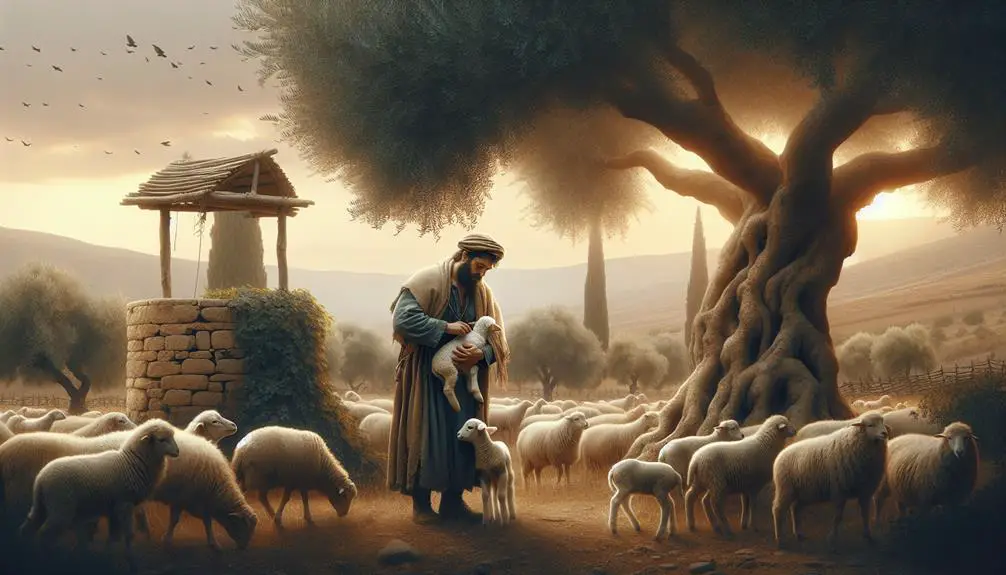
Husbandry in the Bible
Have you ever considered how the soil beneath your feet and the animals that roam it are more than just part of our world, but deeply rooted in the very fabric of biblical teachings?
The Bible isn't just a spiritual guide; it's also a manual on husbandry, showcasing principles of care, stewardship, and ethics that resonate through the ages.
From Abel's respectful offering to the comprehensive care in Noah's Ark, these stories aren't just historical accounts; they're lessons in sustainability and respect for life.
As you explore these narratives, you'll uncover insights that bridge ancient wisdom with contemporary issues in environmental and animal care, inviting you to reflect on how these age-old teachings can inform our modern practices.
Key Takeaways
- Biblical narratives emphasize stewardship, ethical care, and respect for land and animals in husbandry practices.
- Symbolism and parables in husbandry reflect spiritual journeys, responsibility, and divine-human relations.
- Ethical considerations in biblical husbandry highlight animal rights, sustainable practices, and intentional nurturing responsibilities.
- Prosperity and wealth in husbandry are linked to divine guidance, strategic resource management, and ethical breeding practices.
The Genesis of Husbandry
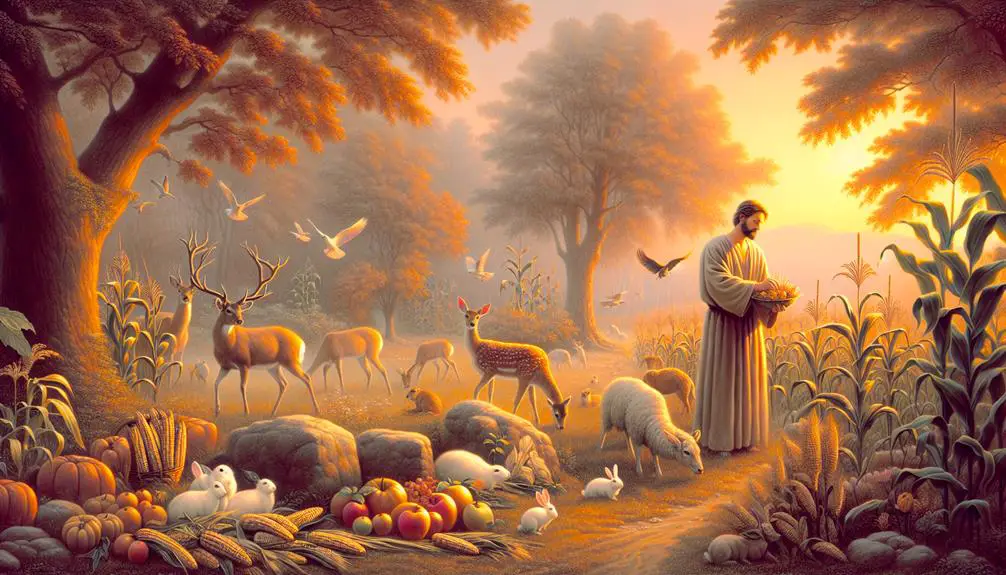
In the book of Genesis, the practice of husbandry emerges as a foundational element of human livelihood, illustrating the early relationship between people and the land they cultivated. You'll find that the narratives and directives within this ancient scripture offer a rich tapestry of insights into agricultural laws and cultivation techniques that have shaped the way societies interact with their environment.
Analyzing these texts, you recognize that the agricultural laws weren't merely practical guidelines but also served a symbolic and moral framework, emphasizing stewardship, sustainability, and respect for the natural world. The cultivation techniques detailed in Genesis, while reflective of the era's technological capabilities, underscore a profound understanding of seasonal cycles, soil management, and crop rotation. These practices, divinely inspired or not, reveal a deep awareness of the ecological balance necessary for sustained agriculture and, by extension, human survival.
This examination of Genesis shows that husbandry wasn't just about food production. It was intertwined with spiritual, ethical, and social dimensions, demonstrating an early comprehension that the health of human communities is directly linked to the health of the land they tend.
Abel's Offering: A Model of Care

You now turn your attention to Abel's offering, a pivotal moment that reveals much about the nature of care in biblical husbandry. Abel's choice of sacrifice underscores his deep understanding and respect for his flock, setting a standard for thoughtful stewardship.
Exploring this act and its symbolism, you uncover layers of meaning in the relationship between humans and the divine, mediated by the care of animals.
Abel's Sacrificial Selection
Abel's selection of the firstborn of his flock for sacrifice exemplifies meticulous care and reverence in his offerings to God. By choosing the firstborn, Abel not only adhered to sacrificial rituals but also demonstrated an understanding of sheep genetics, selecting animals that could signify the best of his herd. This act wasn't arbitrary; it was a thoughtful process reflecting his dedication and respect.
To grasp the depth of Abel's actions, consider these points:
- Sheep Genetics: Selecting the firstborn likely meant choosing genetically strong animals, essential for a meaningful sacrifice.
- Sacrificial Rituals: This choice aligns with ancient practices, emphasizing the importance of offering something valuable.
- Reverence: Abel's approach shows deep respect for divine instructions, setting a precedent for future generations.
Symbolism in Abel's Care
Exploring the depth of Abel's actions reveals a profound symbolism in his meticulous care for his offerings, serving as a timeless model of devotion and respect. Through his dedication, you grasp an understanding of pastoral nomadism, where the bond between shepherd and flock transcends mere survival, embodying a deeper spiritual connection.
Abel's offerings weren't just about the act itself but represented a culmination of care, attention, and respect for his role in the natural order. This contrast sharply with Cain's resentment, highlighting a rift not just between siblings but between approaches to divine worship and stewardship.
Abel's method teaches you the importance of intentionality in your actions, urging a reflection on how you nurture and value your own responsibilities and relationships.
Noah's Ark: Divine Animal Husbandry

Delving into the narrative of Noah's Ark, we find an exemplary instance of divine animal husbandry, where God commands Noah to preserve a pair of every living creature from the impending deluge. This directive highlights a profound commitment to species preservation and underscores the ethical dimensions of global flood narratives. Through Noah's obedience, a blueprint for managing and safeguarding animal life is established, transcending mere survival to embody a divine mandate for conservation and ethical stewardship.
To engage further, consider these key aspects of Noah's divine animal husbandry:
- Global Flood Ethics: The story underscores a moral framework for dealing with catastrophic environmental events, emphasizing the importance of preserving life in the face of global challenges.
- Species Preservation: Noah's Ark serves as an ancient model for biodiversity conservation, illustrating the value of each species in the web of life.
- Divine Stewardship: The narrative invites reflection on humanity's role as stewards of the Earth, tasked with the care and preservation of animal life, guided by divine principles.
In analyzing Noah's Ark, you're not just exploring a biblical tale but delving into the roots of environmental ethics and conservation principles that resonate with contemporary concerns.
Jacob's Flocks: Prosperity and Ethics
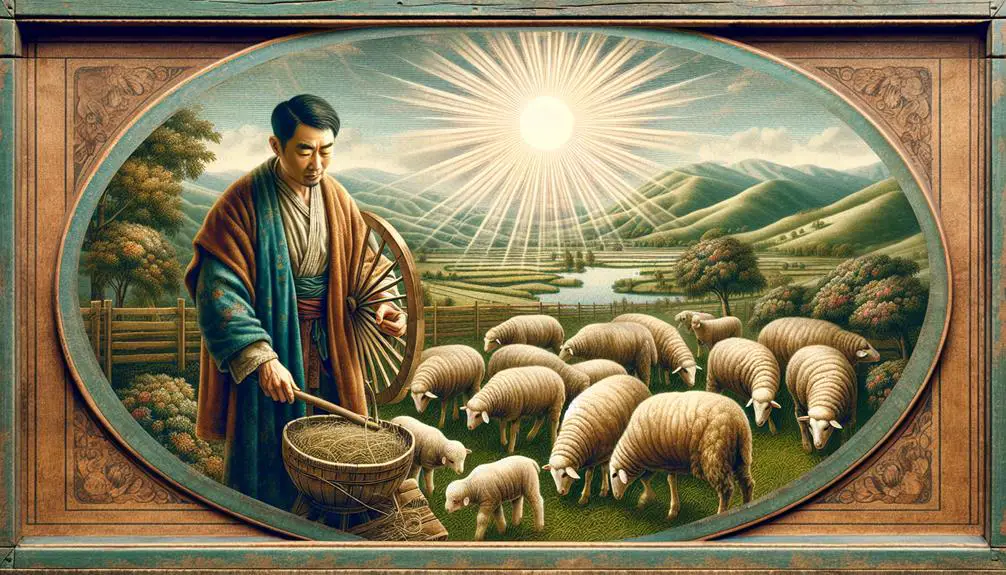
You'll find Jacob's narrative offers a unique lens through which to view husbandry, highlighting divine intervention in breeding, savvy wealth accumulation strategies, and the ethical considerations inherent in animal husbandry.
This story not only reveals the complexities of managing large flocks but also prompts a deeper reflection on the moral responsibilities of caretakers.
As we explore these elements, consider how they intersect with broader themes of prosperity and ethics within the biblical context.
Divine Intervention in Breeding
In the biblical narrative, divine intervention plays a crucial role in the prosperity of Jacob's flocks, raising questions about ethics and divine favor. This intervention manifested through miraculous genetics and supernatural fertility, demonstrating a direct influence from a higher power on agricultural success.
Consider these three key points regarding divine intervention in breeding:
- Miraculous Genetics: The sudden changes in the genetic makeup of Jacob's flocks suggest a supernatural hand at work, beyond natural selection or human manipulation.
- Supernatural Fertility: The rapid increase in the number and quality of animals underscores a divine blessing, emphasizing the role of faith in prosperity.
- Ethical Considerations: This divine favor raises complex questions about fairness and the ethics of divine intervention in human affairs, especially in the context of resource distribution and wealth.
Wealth Accumulation Strategies
Jacob's method of wealth accumulation through his flocks not only showcases his strategic acumen but also raises ethical questions regarding divine favoritism and its implications. By applying investment principles to his flocks, Jacob demonstrates an early understanding of resource management that would resonate with modern investors.
He didn't simply rely on the quantity of his livestock; rather, he focused on the quality and genetic traits that would ensure prosperity. This approach underscores the importance of strategic planning and selective breeding in wealth accumulation.
It's a testament to the idea that success in husbandry, as in any investment, requires more than just initial capital; it demands insight, strategy, and a keen eye for opportunity. Jacob's story, then, serves as an ancient yet timeless lesson in effective resource management and strategic investment.
Ethical Considerations in Husbandry
Exploring the ethical considerations of Jacob's wealth accumulation through his flocks reveals complex questions about fairness and divine intervention. When you delve into the narrative, several aspects demand attention:
- Animal Rights: Jacob's techniques raise questions about the welfare of animals under his care. It's essential to consider how these practices align with contemporary views on ethical treatment.
- Genetic Manipulation: His methods to influence the breeding outcomes of his flocks can be seen as an early form of genetic manipulation. This invites a discussion on the ethics of such interventions.
- Divine Will vs. Human Agency: The role of divine intervention in Jacob's prosperity prompts reflection on the balance between faith-driven outcomes and ethical human actions.
Analyzing these elements, you're invited to ponder the ethical dimensions intertwined with ancient husbandry practices and their relevance today.
The Good Shepherd Metaphor
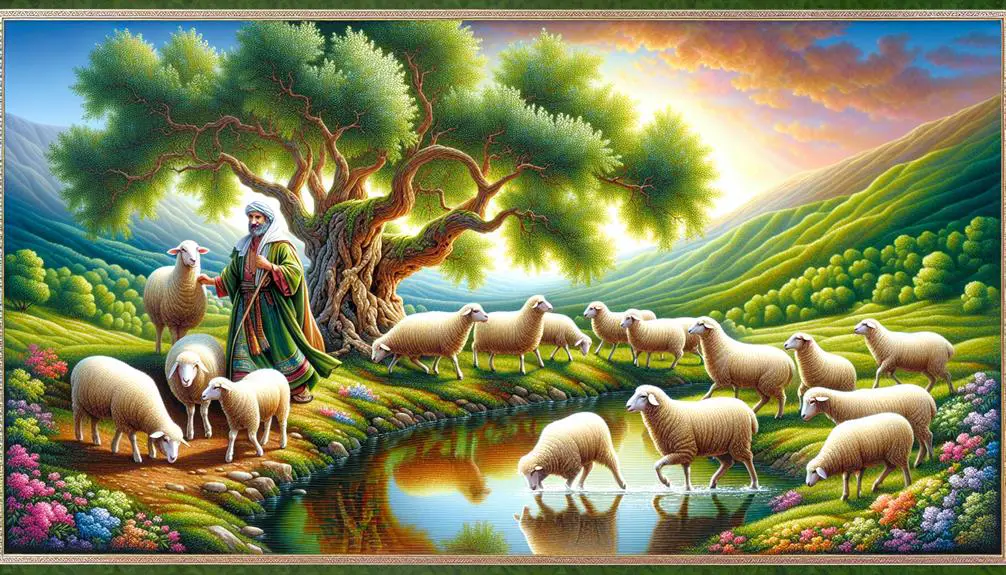
The Good Shepherd metaphor powerfully depicts the relationship of care and guidance between a shepherd and their flock, mirroring the nurturing connection between the divine and humanity. This pastoral imagery serves as a cornerstone in understanding the role of stewardship and protection in biblical texts. It's not just about leading; it's about safeguarding and ensuring the well-being of the flock.
Pastoral Imagery |
Flock Protection |
|---|---|
Shepherd with Staff |
Guarding against wolves |
Green Pastures |
Leading to safe waters |
Finding Lost Sheep |
Healing the injured |
The shepherd's staff isn't merely a tool; it symbolizes the authority and responsibility to protect and guide. Similarly, the green pastures and safe waters represent the provision and care that the shepherd ensures for the flock. This metaphor extends beyond the physical to the spiritual, illustrating the protective, guiding nature of the divine towards humanity. It's a profound reminder of the commitment to care, guide, and protect those entrusted to one's care, reflecting a deep, enduring bond between the shepherd and their flock, indicative of the divine-human relationship.
Parables of Sowing and Growing
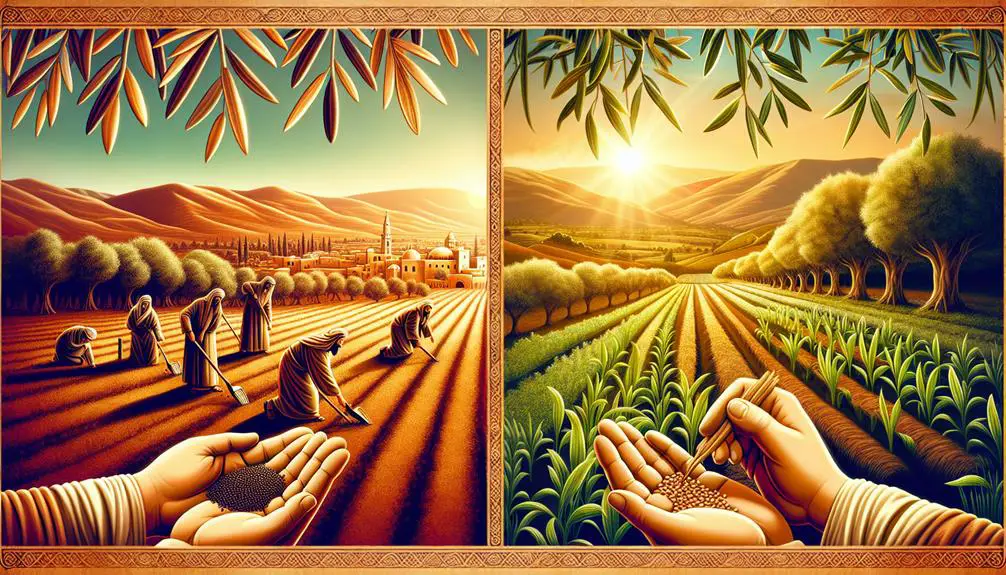
In biblical narratives, parables focusing on sowing and growing offer rich insights into themes of patience, perseverance, and the transformative power of faith. These stories, often referred to as seed parables, serve as vivid illustrations of how faith can start as something small and, with care and time, grow into something vast and impactful.
The growth principles embedded within these parables encourage you to reflect on your own spiritual journey, recognizing the importance of nurturing your faith through various challenges and seasons of life.
To dive deeper, consider these three key elements derived from the parables:
- The Condition of the Soil: This symbolizes the state of one's heart and openness to receive and nourish the seeds of faith.
- The Process of Growth: It highlights the patience required in waiting for faith to mature, underscoring that growth often happens unseen and requires trust in the process.
- The Harvest: This represents the fruitful outcome of steadfast faith and diligent cultivation, emphasizing the abundant rewards of spiritual perseverance.
Through analyzing these seed parables, you're invited to see your faith as a living, growing entity, shaped profoundly by the conditions you nurture it in and the attention you give it over time.
Stewardship of Land and Livestock
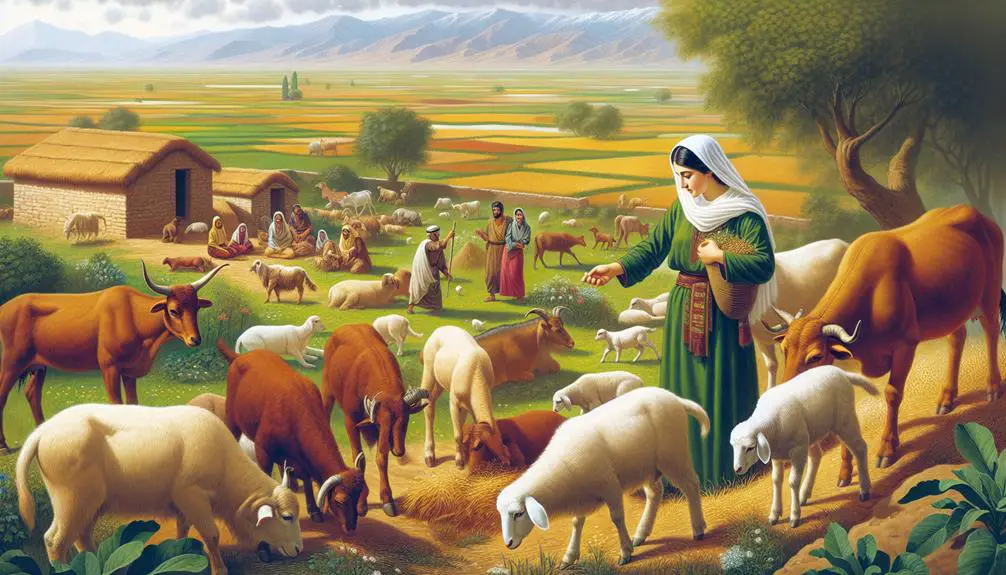
Just as the parables of sowing and growing teach us about the spiritual cultivation of our hearts, stewardship of land and livestock in the Bible offers practical lessons on responsibility and care for the physical world entrusted to us. The scriptures emphasize the importance of wise management of resources, guiding you toward sustainable cultivation practices and soil preservation.
You're encouraged to observe the land's natural rhythms and work in harmony with them, ensuring that the soil's fertility is maintained for future generations. This approach reflects a deep respect for creation, highlighting the need to protect and nurture the environment you're part of. The Bible's teachings on animal husbandry similarly stress the importance of compassionate and thoughtful care for livestock, recognizing animals as part of God's creation deserving respect and kindness.
Adopting these principles, you learn that effective stewardship isn't just about exploiting resources for immediate gain. Instead, it's about maintaining a balance, ensuring that both land and livestock are treated with care and consideration, securing their wellbeing and productivity long-term. This holistic approach underscores a commitment to sustainability and ethical management, principles as relevant today as they were in biblical times.
Modern Reflections on Biblical Husbandry
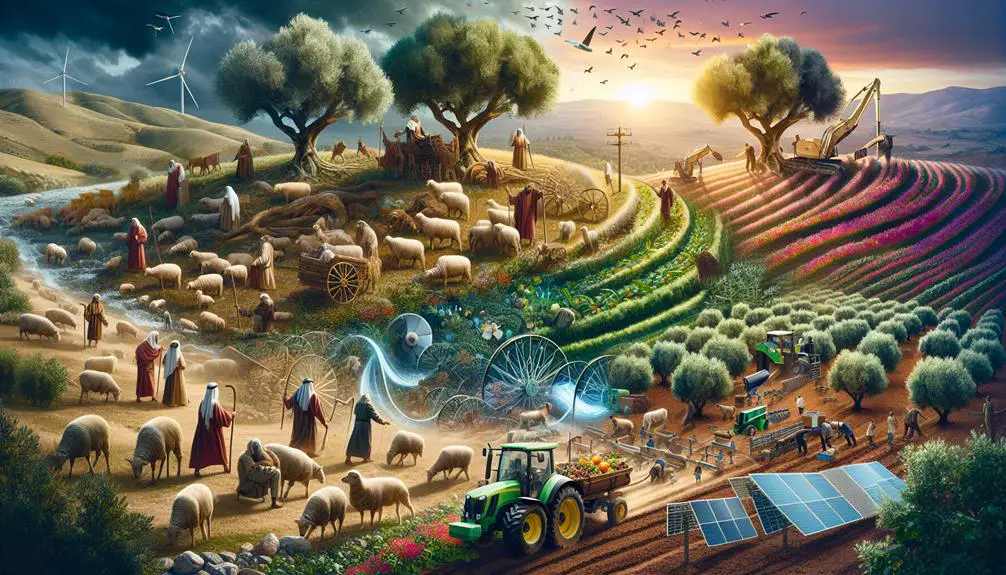
Reflecting on biblical husbandry, you'll find its teachings remarkably relevant in today's quest for sustainable living and ethical animal care. The principles of stewardship and compassion outlined centuries ago continue to offer profound insights into how we might better coexist with the creatures under our care. In this context, it's essential to consider how modern advancements align with these ancient guidelines.
Here are three key areas where biblical husbandry resonates with contemporary practices:
- Animal Rights: The Bible advocates for kindness and responsible treatment of animals. Today, this aligns with growing movements towards animal welfare and rights, challenging us to reconsider our practices and policies to ensure they reflect compassion and respect.
- Sustainable Practices: Biblical texts encourage stewardship of the earth, a concept that mirrors current efforts to adopt sustainable agricultural practices. These include rotational grazing, organic farming, and reducing waste, all aimed at preserving our planet for future generations.
- Technological Impacts: While technological advancements have revolutionized agriculture, they also pose ethical dilemmas. Reflecting on biblical teachings prompts us to question how these technologies can be used responsibly, ensuring they enhance, rather than compromise, the welfare of animals and the sustainability of our practices.
Frequently Asked Questions
How Did the Concept of Husbandry Evolve in Biblical Times Compared to Pre-Biblical Ancient Civilizations?
You're exploring how husbandry practices transformed from pre-biblical ancient civilizations into biblical times. Focus on ancient technologies and climate adaptations.
Initially, you'll notice ancient civilizations developed sophisticated farming techniques, adapting to their climates ingeniously.
As you move into the biblical era, these methods evolved further, incorporating more advanced technologies and strategies.
This shift wasn't just about survival; it was about thriving, showing a deep understanding of agriculture and animal care through changing times.
Are There Any Biblical Mandates or Guidelines Specifically Addressing the Treatment of Pests and Vermin in the Context of Husbandry?
You're exploring whether there are guidelines on managing pests and vermin, focusing on pest control methods and their symbolism.
While the Bible doesn't provide explicit mandates on pest control within husbandry, it does reference pests and vermin, often symbolizing them as punishments or challenges.
This absence of direct guidelines suggests that interpretations on handling such issues are derived more from broader ethical teachings rather than specific instructions on pest management in agricultural practices.
In What Ways Did Husbandry Practices Influence Dietary Laws Mentioned in the Bible?
Interestingly, about 75% of the world's food comes from just 12 plants and 5 animal species.
In the context of ancient practices, you'll find dietary laws deeply intertwined with husbandry. These regulations weren't just about health; they shaped dietary purity and sacrificial rituals, which were central to the culture and religion.
Can the Principles of Husbandry Found in the Bible Be Applied to Modern Sustainable Farming and Animal Welfare Practices?
Absolutely, you can apply biblical husbandry principles to modern sustainable farming and animal welfare. These ancient practices emphasize stewardship of the earth, which aligns with today's goals of climate resilience and ethical treatment of animals.
While genetic modification wasn't an option back then, the underlying ethos of care and sustainability remains relevant. By integrating these principles, you're not just farming sustainably; you're also honoring a time-tested approach to nurturing the environment.
How Did the Role and Perception of Women in Biblical Husbandry Differ From Their Male Counterparts, and What Impact Did This Have on Societal Norms?
When you explore women's roles in ancient contexts, it's clear they often had distinct, sometimes lesser, roles compared to men, impacting societal norms significantly.
In biblical times, this difference was pronounced in areas like agriculture and family management. Women's contributions, while vital, were frequently undervalued, reinforcing gender hierarchies.
This historical perspective can enlighten current discussions on gender equality, showing how deep-rooted some of these disparities are.
Conclusion
In conclusion, the Bible's insights into husbandry aren't just ancient tales; they're timeless principles guiding us toward ethical stewardship and care for God's creation. From Abel's offering to the Good Shepherd, these narratives teach us that prosperity lies not just in wealth, but in the ethical and thoughtful care of the land and its creatures.
Remember, 'As you sow, so shall you reap.' Let's reflect on these lessons, applying them to modern practices, ensuring our stewardship honors both creation and Creator.



Sign up